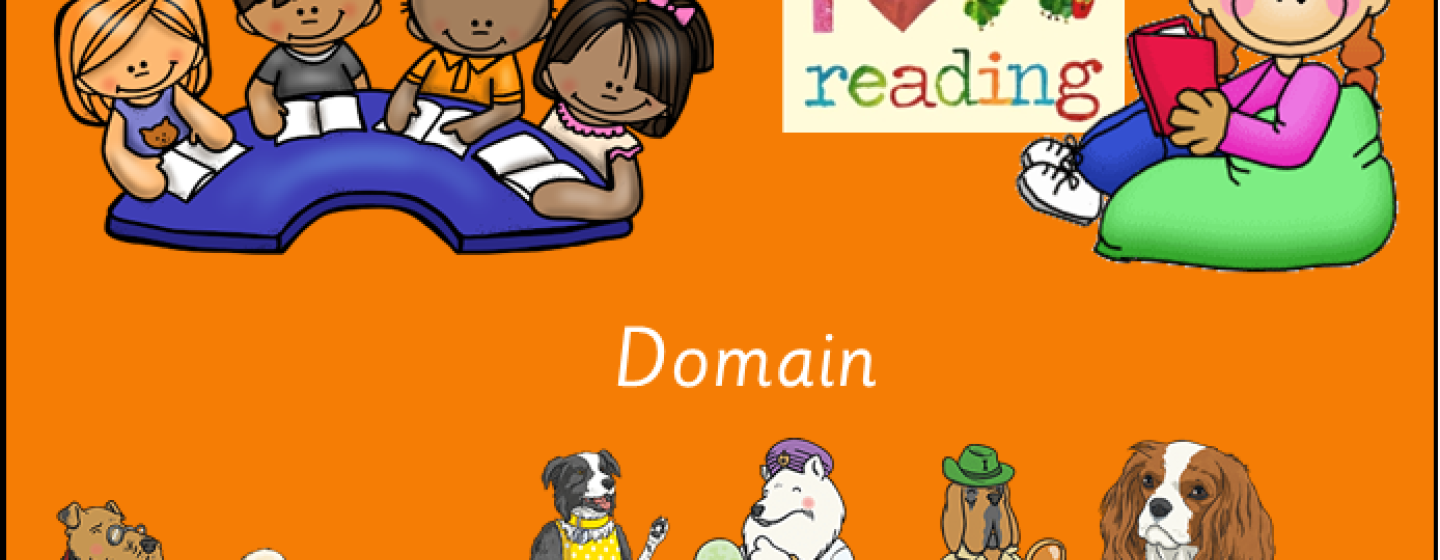
English - Reading
Intent:
At Goldsmith, we are active readers and potential authors...
At Goldsmith Primary Academy, we want to foster a lifelong love of reading by exposing our children to a variety of literature across all curriculum areas. We believe reading opens up a new world for children and gives them the opportunity to explore new ideas, visit new places , meet new characters and develop a better understanding of other cultures. Through the use of high-quality and challenging texts, we are committed to developing our children’s vocabulary which will give them the word power they need to become successful speakers and writers as well as confident readers. Reading is a key life skill and we strive to embed a culture of reading into the core of what we do, providing opportunities for children to read both independently and aloud as well as allowing them the chance to discuss books through exposure to carefully selected whole class reading texts.
Implementation:
What is our curriculum?
EYFS and KS1 - Within our EYFS, children in Nursery start their reading journey by developing their knowledge of sounds in Phase One of Letters and Sounds. When the children have embedded their knowledge of Phase One, the children will move onto more complex skills of orally blending and segmenting. Within the final term, children move onto the Read Write Inc. approach where our children will use pure sounds enabling readers to blend sounds. In Reception, our children are taught the sounds in two sets, starting with set 1 sounds. In KS1 (Year 1), children are exposed to and embed their knowledge of Set 2 and 3 sounds.
LKS2 - In our LKS2 cohorts, children who have been identified as needing additional phonics intervention due to lack of knowledge or not passing the KS1 phonics screen have a phonics intervention session delivered to close the gap in their phonics knowledge.
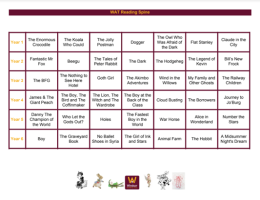
Whole-Class reading:
We have carefully co-constructed a whole school approach towards the teaching of reading which starts within EYFS and continues through until Year 6. Our bespoke curriculum for reading has been planned by a team of passionate reading teachers and the main aim is to ensure children are given a wide range of experiences including experiences that would not be possible other than through books. We believe that no child is left behind. All children, no matter what their reading ability, are exposed to the same texts and lessons as their peers. Alongside these sessions, one domain session (two for UKS2) is taught weekly. Within this session, children are explicitly taught skills and strategies to help their development of comprehending texts.
1:1 reading:
All of our children are heard read by a member of staff once per week and tailored conversations are held which focus around specific domain targets. Alongside this weekly session, all class teachers hear their children read once every three weeks.
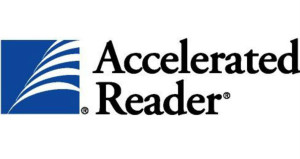 Accelerated Reader:
Accelerated Reader:
At Goldsmith, we use Accelerated Reader to track students’ independent practice and progress with reading. By using AR, we can accurately ensure children are reading texts which are reading age appropriate. Accelerated Reader encourages our children to read independently, at their own level and pace. To baseline and assess children, we complete STAR reader tests. These tests generate a ZPD code based on their capabilities within the assessment as well as a standardised score. The ZPD code then unlocks the texts appropriate to the child’s reading ability. Each text on offer has an online “reading practice” quiz. Our teachers use these quizzes to track each student’s progress and set appropriate goals for each.
When is it taught?
All children receive a reading session every day - 4 whole class reading sessions and one domain focus session for EYFS, KS1 and LKS2 children and 2 sessions for UKS2 children.
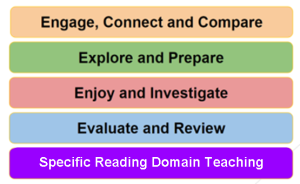 How is it taught?
How is it taught?
Children initially start each new unit/text by exploring the hinterland of the book which involves spending time reviewing the context (e.g. historical, social, setting, characters), key vocabulary which will run through the whole of the text (linked to the themes of the text), the author, and the blurb of the book.
Our team of reading leads have co-constructed an agreed approach to reading which includes four key areas: Engage, Connect and Compare; Explore and Prepare; Enjoy and Investigate; Formal Domain Teaching.
Impact:
How is impact measured?
Throughout our whole class reading sessions, formative evaluation and assessment of pupils understanding is carried out by the teacher. Feed-forward actions are annotated for the next lesson accordingly.
Termly NTS assessments are completed to monitor progress of domain specific comprehension.
How do we know children have made progress?
Children will show progress in weekly domain sessions. Their knowledge and ability to independently answer a variety of questions linked to an age related text will show improvement. Children’s oral and verbal answers within WCR sessions will show more understanding and depth. Finally, we assess children’s progress by analysing raw scores achieved from termly NTS assessments.
How do we challenge and support lack of progress?
Our teachers use their class data effectively to identify areas of whole class weakness. The data is used to inform planning and gaps are covered. Teachers also use data to identify specific weaknesses for individual children. Intervention groups are then planned to offer a more bespoke intervention curriculum alongside their whole class reading curriculum.
How are we inclusive?
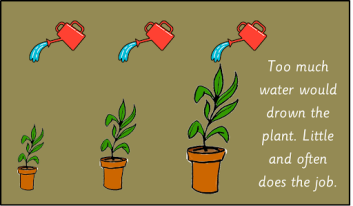
Those children who are identified as SEND or WTS children are exposed to high quality, challenging texts to ensure our reading curriculum is inclusive. These children are supported through the use of scaffolding to allow them to confidently access the text and complete work around.
Supporting our lowest 20%:
Across Early Years and Key Stage 1, Read Write Inc coaching ensures that children are identified early and supported to remain on track.
In Key Stage 2, our children who are identified as needing more intensive intervention with their reading are supported using a carefully planned and well-structured 1:1 reading timetable, where they are heard to read three times per week by an additional adult and class teacher.

